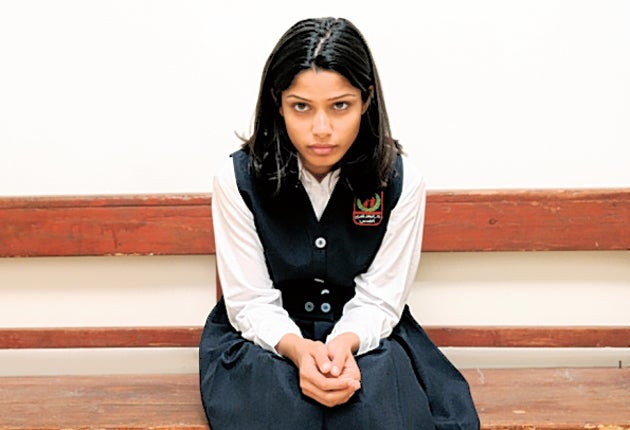Miral, Venice Film Festival

Your support helps us to tell the story
From reproductive rights to climate change to Big Tech, The Independent is on the ground when the story is developing. Whether it's investigating the financials of Elon Musk's pro-Trump PAC or producing our latest documentary, 'The A Word', which shines a light on the American women fighting for reproductive rights, we know how important it is to parse out the facts from the messaging.
At such a critical moment in US history, we need reporters on the ground. Your donation allows us to keep sending journalists to speak to both sides of the story.
The Independent is trusted by Americans across the entire political spectrum. And unlike many other quality news outlets, we choose not to lock Americans out of our reporting and analysis with paywalls. We believe quality journalism should be available to everyone, paid for by those who can afford it.
Your support makes all the difference.American artist-turned film-maker Julian Schnabel follows up on his intimate and claustrophobic The Diving Bell and the Butterly (about a stroke victim) with a full-blown epic looking at the Palestinian struggle from 1948 until the mid-1990s. Miral is plodding at times, choppily edited and unevenly performed. It has very little of the aesthetic polish of Schnabel's earlier work and the director is bound to be accused by his critics of political naivete. However, it's also a courageous and groundbreaking film. There aren't any other movies that spring to mind from Oscar-nominated directors that look at post-war Middle Eastern history from the point of view of Palestinian women.
The film is based on the book of the same name by Palestinian-born journalist Rula Jerbeal. The story begins in 1948 with Hind Husseini (Hiam Abbass), a well-to-do Palestinian woman, discovering a group of orphan kids abandoned in the street in bombed-out Jerusalem. She takes them in and sets up a school to educate them. This school rapidly grows until it has up to 2000 pupils. One of these – in the mid Seventies – is Miral, a doe-eyed girl with a troubled and tragic family background. Miral (played as a young adult by Freida Pinto) is a 17-year-old at the time of the first intifada and is inexorably drawn into the struggle against the Israelis.
Some of the dialogue in Miral is portentous in the extreme. Characters deliver lines like "this is a very crucial moment for our country – our people can't take it any more" rather than speaking in anything that remotely resembles normal speech. There are distracting cameos from stars like Vanessa Redgrave and Willem Dafoe, who are on screen for a few moments and then disconcertingly disappear from the story without trace. Schnabel is covering three generations but his storytelling style is more cumbersome than nimble. At its most leaden, this is more like a school lecture in Middle Eastern history than it is a piece of drama. Newsreel footage is thrown into the mix in heavy-handed fashion and characters – as they age – suddenly go very grey. Quiet domestic scenes and climactic political moments are juxtaposed in seemingly random manner. Even so, it's hard not to root for Husseini (played with great dignity by Abbass) as she tries to educate the orphan kids and thereby save them from a rootless existence in the refugee camps. Miral herself is played very engagingly by Freida Pinto as a mischievous and idealistic teenager with an acute sense of natural justice.
Schnabel doesn't shirk from showing the brutality of the Israeli state toward the disenfranchised Palestinians. In one especially brutal sequence, Miral, suspected of being part of the intifada, is arrested, whipped and humiliated by the Israeli security forces.
Despite Schnabel's remarks that he is "not a political expert and not trying to be", his film is bound to provoke controversy. If he is accused of anti-Israeli bias, he will doubtless be able to counter that every incident he shows is rooted in historical fact. The strength and importance of Miral lies in its vantage point. Schnabel is offering viewers a perspective on the Middle East that they are unlikely to have seen before in other mainstream movies. What is disappointing is that the storytelling itself isn't just a little more sure-footed.
Join our commenting forum
Join thought-provoking conversations, follow other Independent readers and see their replies
Comments